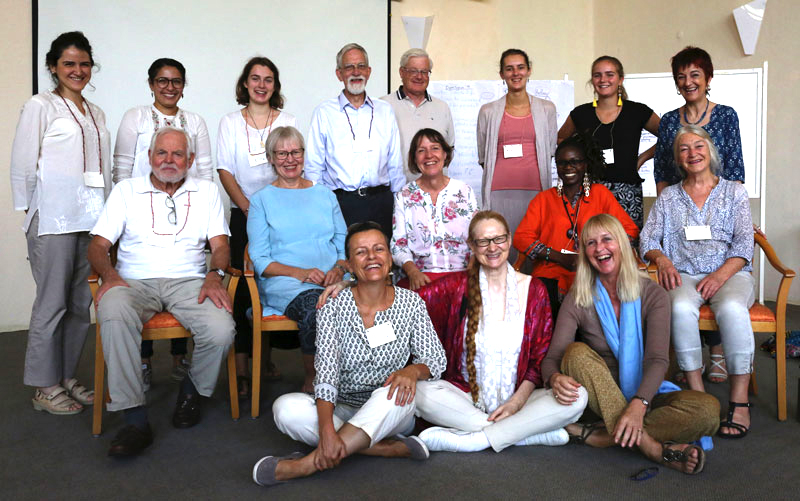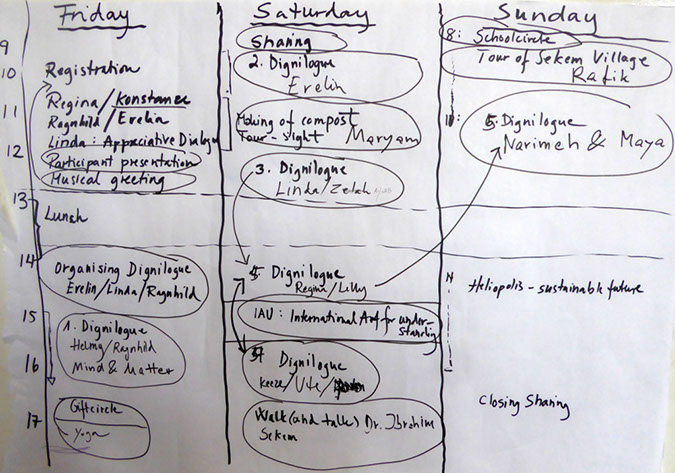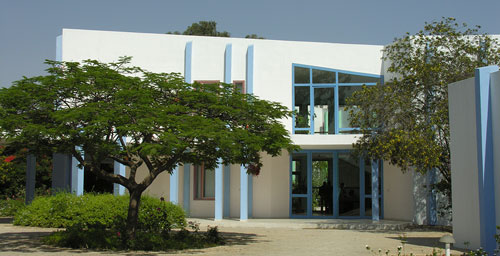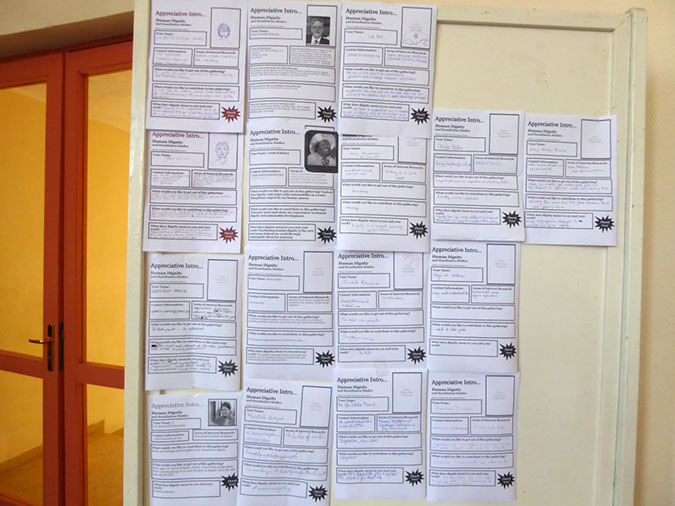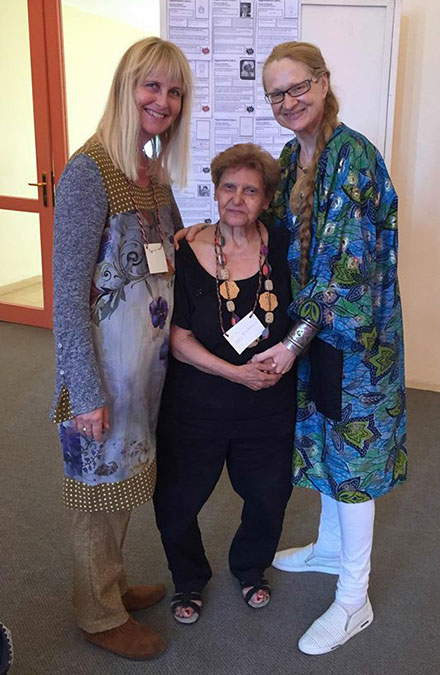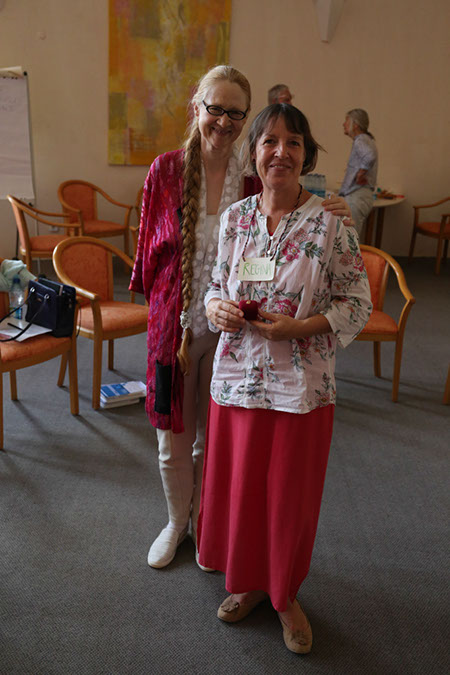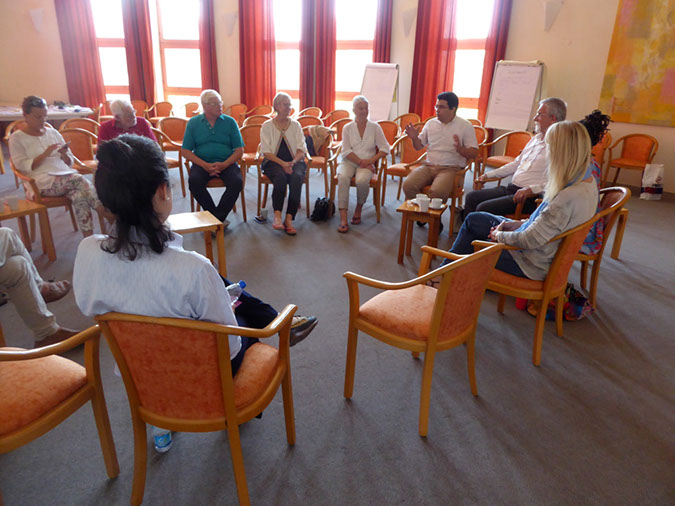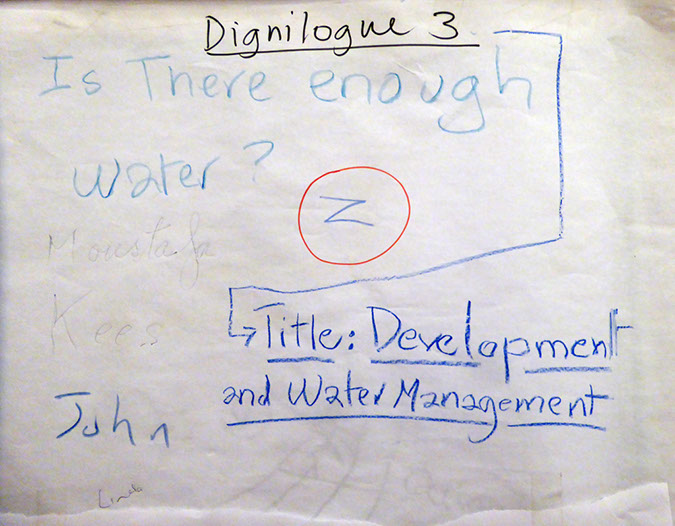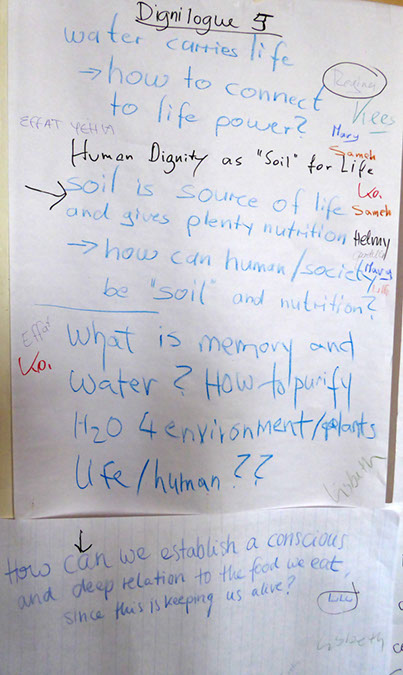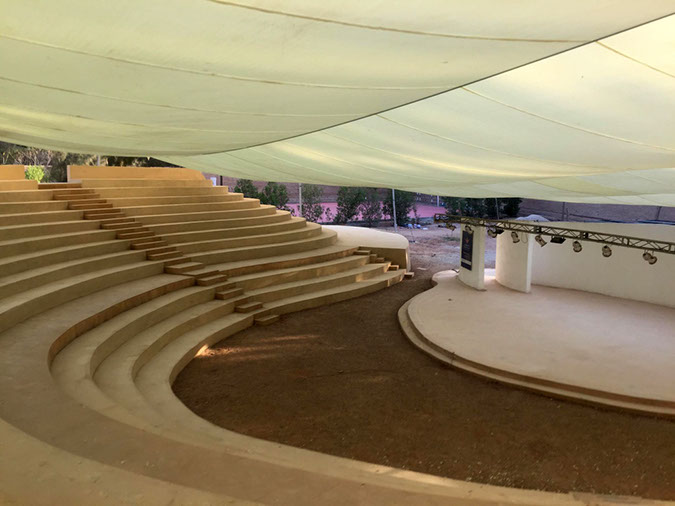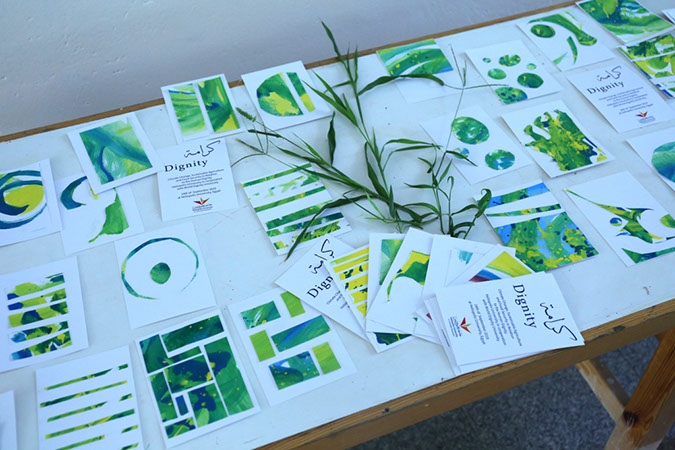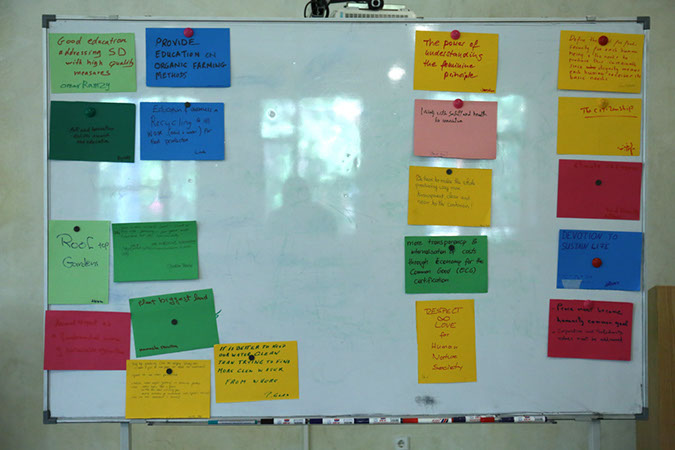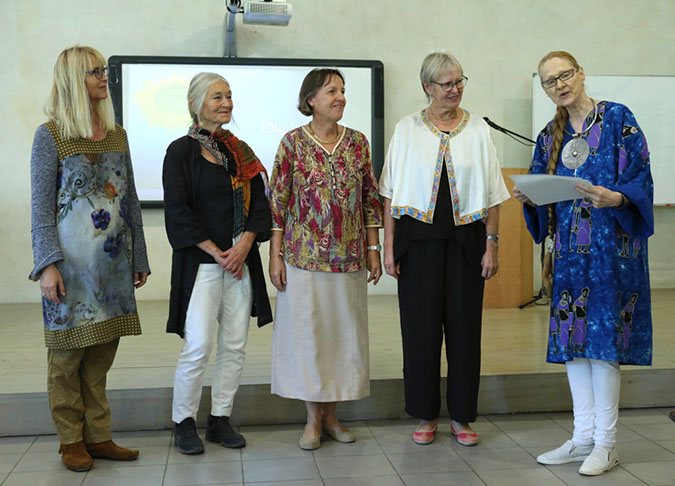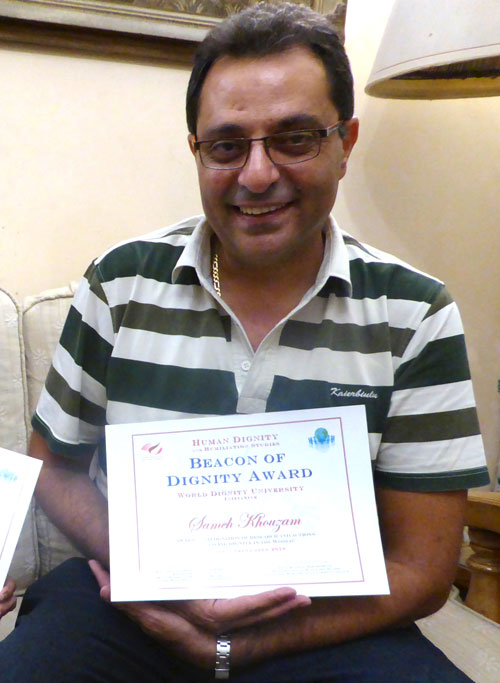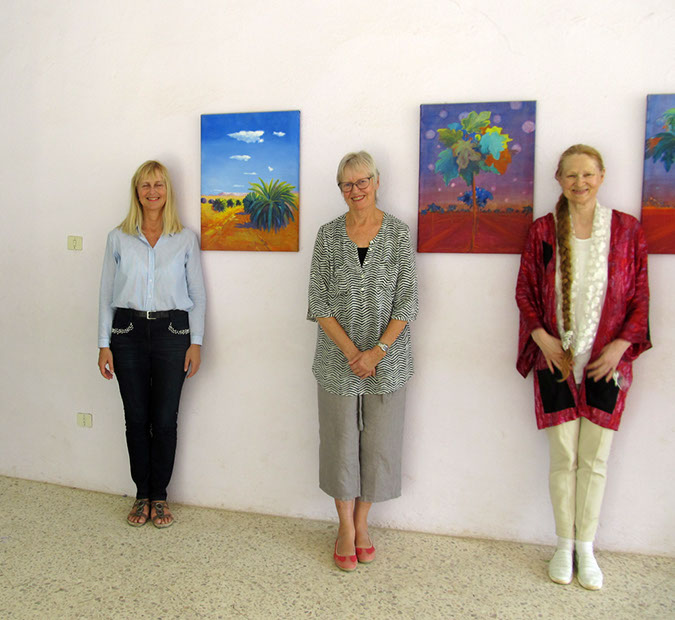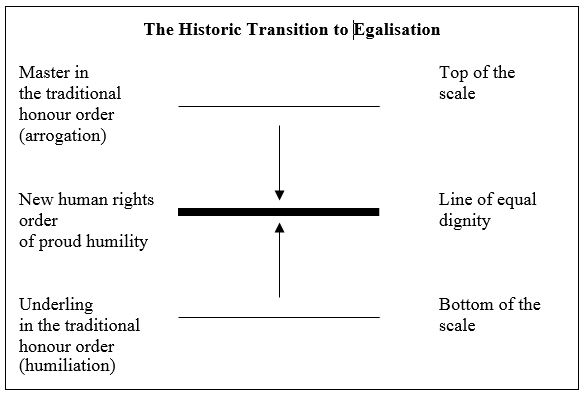Newsletter Nr. 31 (September 2018, subsequent to our 31st Annual Conference of Human Dignity and Humiliation Studies, in Cairo, Egypt, 21st - 24th September 2018)
Compiled by Evelin G. Lindner, in 2018
(Note: This newsletter is written in British English, since this conference took place outside of the U.S. In our NY workshops, we usually use American English.)
Contents
• Pictures
• Thanks!
• Evelin Lindner's reflections
• Your reflections after our conference
• Announcements and Good News
• What Is the Aim of Our Work?
• Welcome Again!
Pictures
(Important note to our conference particants: During our conferences, we always make an effort to ask for your permission to have your pictures posted on this website. However, you may have overheard or misunderstood our question, or you may have changed your mind since, either in total or for specific pictures/videos, please let us know! Thank you! Since we wish to walk the talk of dignity, it is very important for us to do our utmost in respecting everybody's privacy. We refrain from gathering written permissions from you during our conferences, since we value the building of mutual trust in relationships, and we also would like to refrain from contributing to an ever more bureaucratic and legalistic society.)
31st Annual Conference of Human Dignity and Humiliation Studies, in Cairo, Egypt Still photos: Day One, Friday, 21st September 2018 Day Four, Monday, 24th September 2018 |
|
Day One, Workshop Part of the conference, Friday, 21st September 2018 |
Day One, Friday, 21st September 2018 Helmy Abouleish gave the most breathtaking talk! Inspired by the talk given by Helmy Abouleish on 21st September 2018, Sameh Khouzam created a visual conceptualisation that makes visible many elements of the mission of SEKEM. Sameh combines symbols from Pharaonic times together with symbolic expressions that he creates himself. This drawing now waits for an artist to turn it into a final form. • Please click on the pictures above to see them larger. |
On 14th August 2017, the lovely teachers of the Renaissance College in Indore, Madhya Pradesh, India, prepared a large table of gifts for the 'circle of love gifts' of our global dignity family! When I saw the table full of love-gifts, I was speechless! It was such an incredibly beautiful surprise! Dearest Rajesh Dixit and the entire faculty of the Renaissance College in Indore, India! How wonderful that your gifts have travelled to Egypt! See your new friends from the SEKEM Ecovillage and the Heliopolis University for Sustainability gathered around your gifts on 21st September 2018! |
Day Two, Workshop Part of the conference, Saturday, 22nd September 2018 See highlights (see it also as Pdf) Still photos Day Two (from left top to bottom right) • Please click here to see the pictures taken by Narimeh Paeplow • Please click here to see how compost is being made • Please click here to see the pictures taken by Noha Hussein • Please click here to see the visit to the memorial of Ibrahim Abouleish • Please click here to see the evening gathering Still photos of all of the conference • Please click here to see the venues of this conference • Please click here to see the programme for the entire conference that we created together on Day One, and the Dignilogue posters • Please click here to see a collection of portrait photos • Please click here to see photos of Helmy Abouleish • Please click here to see photos of Evelin Lindner Videos • 34 Magdy Ahmed Mohamed Gives the Gift of His Music • 35.0 Dignilogue by Evelin Lindner (version recorded by Narimeh Paeplow) • 35.1 Dignilogue by Evelin Lindner • 36 Dialogue After Evelin Lindner's Dignilogue • 37 WDU Message: Ute Meinel and Kees Hulsman • 38 WDU Message: Zaynab El Bernoussi and Linda Kabaira |
Day Three, Workshop Part of the conference, Sunday, 23rd September 2018 See highlights (see it also as Pdf) List of Dignilogues • Dignilogue 1: Matter and Mind (Day One) Helmy Abouleish and Ragnhild Nilsen • Dignilogue 2: How Does a Dignified Future Look Like? (Day Two) Evelin Lindner • Dignilogue 3: Development and Water Management (Day Two)? Zaynab El Bernoussi and Linda Kabaira • Dignilogue 4: Making Dignity Global and Sustainable (Day Two) Ute Meinert and Kees Hulsman • Dignilogue 5: Human Dignity As 'Soil for Life' (Day Three) Narimeh Paeplow and Maya von Maltzan Still photos Day Three • Please click here to see the pictures taken by Evelin Lindner • Please click here to see the pictures taken by Lisbeth Glad • Please click here to see the pictures taken by Noha Hussein Still photos of all of the conference • Please click here to see the venues of this conference • Please click here to see the programme for the entire conference that we created together on Day One, and the Dignilogue posters • Please click here to see a collection of portrait photos • Please click here to see photos of Helmy Abouleish • Please click here to see photos of Evelin Lindner Videos • 39 WDU Message: Linda Kabaira and Maya von Maltzan • 40 WDU Message: Ragnhild Nilsen and Evelin Lindner • 41 The children of SEKEM sing Biladi (My Homeland) |
Day Four, Public Event at Heliopolis University for Sustainability, Monday, 24th September 2018 See highlights (see as Pdf) Still photos Day Four • Please click here to see the pictures taken by Sameh Khouzam of a tour through Heliopolis University • Please click here to see the pictures taken by Lisbeth Glad • Please click here to see the pictures taken by Narimeh Paeplow • Please click here to see the pictures taken by Sameh Khouzam Still photos of all of the conference • Please click here to see the venues of this conference • Please click here to see the programme for the entire conference that we created together on Day One, and the Dignilogue posters • Please click here to see a collection of portrait photos • Please click here to see photos of Helmy Abouleish • Please click here to see photos of Evelin Lindner |
Honoring Helmy Abouleish, Ragnhild Nilsen, Regina Hanel, Lisbeth Glad, and Gerdelin Bodvin with the Beacon of Dignity Award, during the Public Event at Heliopolis University for Sustainability, on Day Four of the conference, Monday, 24th September 2018 |
20th September: Ragnhild Nilsen, Lisbeth and Per Glad, and Gerdelin Bodvin have arrived! We had breakfast, we made ourselves familiar with the conference venue, and we admired Lisbeth's paintings! • Please click on the pictures above or here to see all the 81 photos that Gerdelin took with her camera!. |
 |
19th September 2018: What a gift! Since 1985, Evelin has been searching for this opportunity! Evelin is appalled by the current trend to use microphones, loudspeakers, and electronic effects in music. In 1985, she was invited to a little group of musicians who played the lute and sang together without microphone or loudspeaker in a private home near Tahrir Square. After more than thirty years of searching, Magdy Ahmed Mohamed finally fulfilled Evelin's dream! Please listen to her favourite songs: • Zuruni kulli sana marra, a composition by Sayed Darwish (1) (see the lyrics) • Zuruni kulli sana marra, a composition by Sayed Darwish (2) (see the lyrics) • Amal hayati, a song first performed by famous Egyptian singer Om Kalthoum (see the lyrics) • Mohammed Abdel Wahab • Oh flower in my imagination (with tango rhythm), by Farid al - Atrash (see lyrics) • Aghadan al kaaq |
2nd September 2018: What a privilege to meet Regina Hanel for the first time in person, after two years of email contact! It was a joy to show her the 'circle of love gifts' and offer her the red scarf sent to her from Fanny Duckert of the University of Oslo in Norway! • Please click on the pictures above or here to see them larger. |
| 1985, 1994, and 18th January 2007: The SEKEM initiative was founded 1977 in Egypt and received the RIGHT LIVELIHOOD AWARD also known as the “ALTERNATIVE NOBEL PRIZE” for 'establishing a business model for the 21st century in which commercial success is integrated with and promotes the social and cultural development of society through economics of love'. Evelin was aware of Sekem as far back as 1985, when she lived in Cairo and Sekem came with a Volkswagen bus to the German embassy once a week to offer their products. In 1994, she met Ragnhild Nilsen in Norway, head of Sekem Scandinavia, and she visited Sekem for the first time in 2007. Please see Konstanze Abouleish on the photo above, the manager of what was then called Conytex, producer of clothes. • Please click on the pictures above to see them larger. |
Dear Friend! Thanks!
We had a remarkable dignity conference in Cairo in Egypt! The conference was titled 'Dignity and Innovation – Strategies for a Sustainable Future, with a Special Focus on Agriculture and Water'. I lack adequate words to express my appreciation, admiration, and deep gratitude to all those who made this conference possible!
Please see the first invitation from 2nd February 2018, and from 15h June 2018, a little video invitation, a short programme, the programme of the Public Event, and a summary of the highlights of the conference (see it also as Pdf).
Please allow me to begin this newsletter by expressing my profound gratitude to the esteemed inspirer of this conference, our dear Ragnhild Nilsen, and to our gracious host, the SEKEM Ecovillage and Heliopolis University for Sustainability in Cairo. The Heliopolis University has been created by SEKEM, which was founded by Dr. Ibrahim Abouleish, and is now being carried into the future by his son Helmy Abouleish, Chair of the Board of Trustees of Heliopolis University, together with his wife Konstanze and the entire SEKEM team and the faculty of the University.
Our gratitude goes to the wonderful team around Helmy and Konstanze Abouleish, Regina Hanel, and many others, together with wonderful Mohammed Anwar of the Centre of Education for Sustainable Development, Heliopolis University, and Dr. Omar Ramzy, Director of Centre of Education for Sustainable Development, with their entire faculty.
There are no registration fees for our conferences, we usally share cost according to ability. We thank all participants of this conference for paying for their own travels and housing, and we are deeply grateful to SEKEM Ecovillage and the Heliopolis University for Sustainability for offering such a wonderful venue, together with incredibly delicious food!
I am so proud that we were able to honour and celebrate our host teams with our Beacon of Dignity Award! We did this during our Public Event on 24th September. And we would also like to express my warmest gratitude to Noha Husein for being with us taking photos in preparation for a wonderful overview over highlights (see it also as Pdf). And we thank Elsayed Said for making sure that our IT systems worked and the venue was well prepared!
We wish to acknowledge particularly Ragnhild Nilsen, who so wonderfully took responsibility for coordinating our Dignilogues!
We thank all participants for joining hands in making this conference one of our most special and most memorable ones. Everyone participated by not only offering their particular personal perspectives, everyone also engaged in an enormously enriching process of co-creating new horizons of meaning for ourselves and for our societies, including world society.
Linda and I, we would like to invite everyone to contribute to this newsletter with your reflections (whatever you wish to share here, just send it to me so that I paste it in further down)! We invite comments, thoughts, and reflections both from the participants, and from those who were with us in spirit!
Please allow me to remind you that all our conferences are part of our ongoing relationship-building work (rather than 'stand-alone' events). We wish to nurture a global community of people who strive to bring more dignity into the world. Our 31st Annual Dignity Conference was yet another opportunity, unique in its intensity, one that deeply inspired also me personally. The diversity of backgrounds of our participants was remarkable: Egypt, Morroco, Morroco-Canada, Egypt-Holland, Norway, Germany, Silesia-Germany-Norway-global. Many members in our global network share a biography of journeying, both geographically and with respect to their life paths and experiences. Many have experienced profound turning points in their lives, which often foster deep change.
As you have noticed, we strive to conduct our conferences in ways that are different to mainstream conferences. Our conferences are designed to transcend the 'guru' model of having one or two noted celebrities orchestrating the experience for the non-celebrities. We wish to avoid a top-down approach to organising. Rather, we strive to practice a ripple-out approach, cultivating mutually beneficial action that emphasises loving service (rather than servitude!). We strive to refrain from relegating 'administrative' work to secretaries or marginalised members of society. We invite universal responsibility, universal co-leadership, leadership that encourages everyone to step in and contribute according to their interests, abilities, and passions.
In traditional conferences, participants arrive with the tacit expectation to spend the day more or less isolated, either as presenters or listeners, and when the official day ends, they expect to dissipate to do 'their own thing'. The only time when everybody is drawn together officially, at least to a certain degree, is during what is called Q&A (questions and answers, rather than dialogue). Group-building is relegated to the coffee-pauses or friendships being nurtured privately on the sidelines. As a result, very often, there is a widespread sigh after conferences: 'I had to give a paper to get funding for the conference, but slept through the presentations of the others, only the coffee-breaks where really good, because I enjoyed meeting old friends'.
The most important aim of our conferences is to transcend this situtation and to make clear that the 'work' of building a dignity family is the most important feature of our conferences. Our participants are invited to take responsibility for this process also outside of the 'official' schedule. Linda and I personally see our main task in nurturing this social-psychological connectivity rather than in the administration or scheduling of our conferences, as important as also this is for a dignified conference. We wish to nurture a climate of togetherness in equal dignity, of holding hands as human beings among human beings (Ubuntu), who act together in a spirit of mutual responsibility for each other, and who engage in mutual learning and teaching. We aim for a style that manifests the fact that we are one single human family on one single tiny planet, and that we have to learn to act like a good family if we wish to survive as a species. In our work, we wish to stay clear of abusing this connectivity for ulterior purposes, be they ideological, religious, monetary, or else. This approach includes the entire conference, with its pauses and evenings.
In sum, the Dignilogues of our conference were yet another of our 'unconference' conferences: It was a co-created sharing of insights. Rather than organising time around 'presentations', we strove to take a collaborative approach to planning our time together. We used the format of Dignilogues (Dignity + Dialogue), or conversations on topics proposed by participants, a format that we have adapted from the classical Open Space approach (see Harrison Owen on our Global Advisory Board). On the first day of the Dignilogue Workshop, we invited everybody to suggest a topic and to be a facilitator/leader for her or his dialogue session. Those participants who proposed a topic, described it to the group. Then, collectively, we combined and prioritised ideas as needed to finalise the schedule for the rest of the conference. The Dignilogue process encouraged all of us to meet in a spirit of mutual support, equal dignity, and flexibility, which enriched the conversations throughout our 'unconference' conference.
We sometimes compare a 'formal conference' with a car without wheels, an 'informal conference' with a car without a motor, while our approach would represent a car that moves. We wish our conferences to manifest dignity, and therefore we invite all participants to move the conference forward together, holding hands as fellow human beings, rather than having a rigidly steered conference.
Let me now explain our solidarity economics approach (see also my book A Dignity Economy). All participants are gifting their time pro bono. Our work is a labour of love. Nobody is being paid or gains monetary advantages from our work. Our human dignity movement has a near zero budget. We refrain from going down the path of so many not-for-profit initiatives, which end up becoming as profit-oriented as for-profit businesses, or even more. We do whatever we can to refrain from building an 'empire' of our work. What we wish to do instead, is to nurture dignity, at all levels and in all details of our work. We wish to highlight our shared humanity on our home planet, rather than abusing social-psychological connectivity for 'empire building'.
There are no registration fees for our HumanDHS conferences (or our online sessions). By practicing a 'lean, green' spirit of shared responsibility, our HumanDHS community has conducted our events for more than a decade by assessing our expenses during the conference and inviting participants to contribute according to their ability (we also gladly welcome electronic contributions in support of our work). I myself live almost without money and do not receive monetary remunerations for my dignity work, which I consider to be a labour of love which I gift to our human family. In our conferences, we always attempt to find ways to cover the cost throughout the conference in the most dignified and dignifying ways. In this collaborative way, we are able to also honour those who contribute more in kind than in monetary ways.
Please join me therefore in thanking everyone for their contributions to this conference! We send our profound gratitude to every single participant and supporter for your generosity! You are beacons of dignity in this world!
Since all participants in our conferences are fully responsible for bearing the cost of their own travel, transportation, and accommodation arrangements, we always kindly ask local participants who reside in close proximity of the conference venue to lend a helping hand to those traveling from afar, which also helps us keep our events collaborative and affordable for all. Allow me to extend our warmest thanks to all those who reside in Cairo and generously gave their support! I myself am deeply thankful to all those who were so generous to include me into their homes throughout August and September in the most touching ways!
A reason for sadness was that Linda Hartling and her husband Richard Slaven could not be with us in person, due to their family health situation. However, they were very very close in spirit, and without their daily support our conferences would not be possible. Thank you, dear Linda and Rick!
Please see a list of the videos that Linda Hartling created so as to be with us from afar:
Greetings:
• Greetings from Portland, Oregon, America, 2018 (2 minutes)
• Greetings from Portland, Oregon, America, prepared 2015 (7 minutes, and a Pdf from 2014)
Please see Introductory Videos created by Linda Hartling:
• Dignilogue: An Introduction to Dignity + Dialogue, created on 31th May 2015 for our 2015 Kigali Conference
• Greetings to All (short version), created on 16h April 2013 for our 2013 South Africa Conference
• Greetings to All (long version), created on 16h April 2013 for our 2013 South Africa Conference
• Welcome to Everybody, created on 12th August 2012 for our 2012 Norway Conference
• Our Open Space Dignilogue Format, created on 12th August 2012 for our 2012 Norway Conference
• Please see also the videos on our Appreciative Frame, created by Linda Hartling:
- Appreciative Enquiry 4, a video that was recorded on May 27, 2015, in Portland, Oregon, USA, by Linda Hartling, for the 25th Annual Conference of Human Dignity and Humiliation Studies, in Kigali, Rwanda, 2nd - 5th June 2015.
- Our Appreciative Frame 3, a video created in December 2014 (see also Pdf), for the 2014 Workshop on Transforming Humiliation and Violent Conflict, in New York City, December 4–5, 2014.
- Appreciative Enquiry 2, a video that was uploaded onto YouTube on August 11, 2012, in preparation of the 19th Annual Conference of Human Dignity and Humiliation Studies, 27th-30th August 2012, in Oslo, Norway.
- Appreciative Enquiry 1, a video that was recorded on October 30, 2011, in Portland, Oregon, USA, by Evelin Lindner, for the World Dignity University initiative.
We warmly welcome you to our future conferences. Your participation is of great importance. We are certain that your contribution will have enduring reverberations not only for your work, but also for our dignity network of scholars and practitioners working throughout the world.
Francisco Gomes de Matos, peace linguist from Recife, Brazil, co-founder of the World Dignity University initiative, kindly sent us a 'Communicative Dignity: A Checklist' from Recife, Brazil, where he concludes that 'dignity is more than a quality; it is the essence of our humanity'.
May we extend our very warmest thank-you to YOU ALL!
There are no words to express our appreciation for your amazing contributions!
Evelin & Linda, on behalf of our entire network, 2018
Evelin Lindner's reflections (see them also as Pdf file)
You may like to have a look at my picture page of 2018, where I documented my reflections during my time in Cairo in August and September 2018.
30th September 2018:
Dear friends! I am still filled with fond memories from our conference and miss you all. I am amazed how you taught me to understand ever more, how important the work of relationship building is! The dominator model of society (Riane Eisler's coinage) of the past millennia still guides mainstream society, and this includes conferences. I am so thankful to all participants for taking the risk of being part of a conference that is self-organised, rather than rigidly pre-planned and conducted in a top-down manner.
Our Dignilogue days were unbelievably enriching for me! The intellectual sharing was so much enhanced by the fact that we also connected emotionally. It became so palpable to me how the concept of 'sharing ideas' without emotional person-to-person connection risks failing to open up for the deep understanding and learning that the Dignilogue format intends. This does not mean that I do not enjoy 'helicopter presentations' as well, where people 'fly in and out' for their presentations, and I, sitting in the audience, learn a lot. However, it is so interesting to observe how this enjoyment is so different when deep sharing happens in Dignilogues! The entire conference was such a wonderful learning experience for me, for which I wish to profoundly thank you all!
Relationship-building is usually vastly underrated: As I observe it, not only the academic community lacks what might be called emotional literacy. After living globally for the past forty years, I observe how the work of creating trusting human-to-human connections fails to be done in so many contexts, not least the academic context: it is still seen as a negligibly 'female' task. What happens instead is that a 'male' script of throwing one’s weight around turns what should be a community into a scary battlefield where mistrust becomes the 'smartest' skill to practice. To say it in a caricature: the traditional professor/director was a man, who had a female secretary, who did all the relationship-building work for him, she smoothed over his relational rough edges, soothed those he had insulted, and even bought the flowers for his wife's birthday. By naming this situation, I do not wish to blame the professor/director or the secretary, since this was 'the way it was'. However, in present-day's world, it becomes dangerous to maintain this habitus and remain blind to these arrangements, blind to these blind spots. Particularly, if we wish to nurture a global citizens movement, people from different backgrounds will have to come together, and relationship-building work will need to be carried out much more broadly and intentionally than has been so far. No technical innovation can replace this, no ever-so 'professional' approach can remedy this. Notions such as 'family', 'friend', 'colleague', or 'stranger' will have to be brought together into a sense of being part of a global dignity family. This relationship-building work is therefore one of the main foci of our work in the global HumanDHS fellowship. Linda Hartling, our director, and her expertise in relational-cultural theory, as developed by her mentor Jean Baker Miller, is therefore crucial for our work.
I recommend my book Making Enemies: Humiliation and International Conflict, because there I discuss how difficult it is to make the transition from a hierarchical system to equality in dignity. (Please ask me and I share my private review copy with you.)
'Dignitaries' who feel entitled to arrogate superiority may define their superiority as essential for their dignity, and may violently resist any call to join the rest of society at the middle, at the line of equality in dignity, let alone help those from below to rise up. They may passionately refuse any attempts to humble them and will interpret those attempts as humiliation. A man who beats his wife, for instance, may feel entitled to do so, and he may interpret any endeavour by the social worker to make him equal to his wife as humiliation. He may accuse the social worker of being a trouble maker who disturbs the peace of the house and spoils his wife's willingness to be obedient. Furthermore, he may accuse his wife of 'hating men' if she calls for equal dignity and rights. Feminism is therefore among those movements that have become victims of this polarising bias. Or, another example: Many white supremacists in South Africa were proud that 'their' fellow black citizens had a better quality of life than in many other African states; in their eyes, their fellow black citizens were simply ungrateful whenever they called for equal rights and dignity.
Those who have privileges typically are blind to those privileges and do not notice the systemic disadvantages others suffer. If they do notice their privileges, many of them tend to be convinced that they deserve them. And even if they intellectually understand that they do not necessarily merit having those privileges, they will resist giving them up due to the simple human weakness called loss aversion. Loss aversion means that one hesitates to give up what one has, even if what one would receive in exchange would be better. Wealthy people therefore tend to live in social 'bubbles' that reinforce their sense of entitlement and paint those in society who wish to rise up from below as undeserving 'enemies'.
As I explain in the Making Enemies book, also those at the bottom of the hierarchy encounter countless challenges, not just outside of themselves in society, but also in their own psyches. The beaten wife, for instance, or any other person at the bottom of the ladder, may staunchly defend her lowly position as her inherent dignity, her inherent identity, and therefore defensively resist external attempts to raise her to the level of equality in dignity with all people. Or, others may use their lowly position as a justification for why they cannot even make an effort to rise up. Or, they may revel in their sense of victimhood and turn victimhood into an asset. One section in my Making Enemies book addresses the 'addiction to humiliation'.
These are the chapter titles in the book:
Part I: Humiliation at Work in the Mind 1
Chapter 1: The Mental Landscape 3
Chapter 2: Once the Cure, Now the Disease 11
Chapter 3: Globalization and Egalization 37
Part II: Humiliation at Work in the World 63
Chapter 4: Humiliation and Misunderstanding 65
Chapter 5: Humiliation and Conflict 88
Chapter 6: Humiliation and Terrorism 107
Part III: Why Humiliation Doesn’t Work 125
Chapter 7: The Humiliation Addiction 127
Chapter 8: The Humiliation Antidote 141
Chapter 9: The Future of Humiliation 163
Also in my other books, including my new book on Honor, Humiliation, and Terror, I address these problems.
The way out of all these challenges is to think comprehensively and acknowledge the problems that are to be expected when a hierarchy is to be dismantled. Those at the bottom and those at the top are called on to discontinue vilifying each other and instead to help each other overcome all obstacles. Obstacles are the systemic humiliation engrained in societies after many hundreds or even thousands of years of hierarchy, and the conditioning this has engendered in the minds and souls of the population. Any liberation from the chains of oppressive hierarchy is bound to be difficult for the first generation - it will produce to many disappointing results - and only the next generation may find space and be wise enough to nurture the liberation constructively. During the transition period, the revolutionaries will be punished by all those who had been successfully brainwashed, over centuries, into believing that their superiority or inferiority is god-given or in line with nature. The first generation of revolutionaries will also not have the skills to align structure with feelings in constructive ways.
1st October 2018:
The problem of true love
It is interesting for me to compare my experience in India last year, with my experience in Egypt this year. When coming to India, I learned from the young students that they wish for less pressure from their extended families, most importantly, they wish for what they call 'love marriage' rather than arranged marriage. They wished for authentic, mutually beneficial connection, rather than relationships primarily designed to achieve some form of strategic advantage.
I promised them that our conference would offer them the very 'training in dialogue' that they will need in case their wish is fulfilled and they have the opportunity to make love work in daily life. Cultivating relationships based on authentic connection, mutuality, and love involves practicing new ways of being in relationship. This can be much more complex and demanding – yet far more emotionally rewarding – than engaging in a relationship that has been arranged by others or a relationship of superficial infatuation. To build loving, authentic connections, dialogue skills such as 'listening-others-into-voice' are indispensable. I wrote a book on 'Big Love', and I send the links to all my books and articles as my gift to everybody who is interested. 'Big Love' is needed not just in marriage, it is needed in all of society, locally and globally.
Let me offer a kind of timeline for liberation:1. In a traditional dominator model of society (Riane Eisler’s coinage), spouses are expected to be dutiful, they have rights and duties. Feelings on all sides are imprisoned in a rigid societal structure. Only when the partnership model of society is realised, are feelings allowed to flow and shape the official form of the relationship (including marriage and divorce).
2. True love goes beyond duty and is spontaneous, it cannot be forced, ordered, or commanded by contract. True love contributes to the healthy psychological growth and development of both people in the relationship. When love emerges, it still has to be nurtured with dignified dialogue, otherwise it will falter. Infatuation is not yet true love.
3. In partnership societies, when love is missing in a relationship, partners can align their feelings with reality by working through the process of divorce. In a traditional dominator context, in contrast, the concept of true love might either be unknown, or, if it is known, and if true love lacks, both partners are expected to close their eyes to the truth of their lives without love. Partners may even try to humiliate their spouses into shame about the lack of love in their lives. They may blame each other, for instance, for the fact that true love cannot be ordered as a duty. Or they may choose certain religious teachings and overlook alternative religious teachings so that they can hide the lack of love in their relationships behind those teachings (for instance, some religions offer the view that sex is sinful and should best be avoided, except in marriage, where it is part of duty but should be kept at a minimum). Or they may accuse their partners of being selfish if they do not sacrifice their soul to sustain their loveless relationships for the stability of family and society. The subordinate partner may unwittingly accept being humiliated, he or she may internalise these arguments that suggest that s/he is required to stay in a loveless relationship, and thus her internalised humiliation transforms into self-humiliation.
4. In a traditional dominator context, people are being taught to keep a perfect facade and to believe that it protects the children if all pretend that everything is perfect, even while their feelings betray the opposite. The entire society is being humiliated by the misinformation that pretends to protect families and children. All engage in self-humiliation by believing in this misinformation and, as a result of believing in this, they punish all those who want to liberate themselves from this trap.
5. Traditional dominator societies are often unaware of the significance of the unconscious, internal impact of humiliation and unaware that humiliation and self-humiliation damage the next generation even if it is hidden behind a veil of pretence. Traditional dominator societies close their eyes to the fact that children are hurt and deeply confused by mixed messages of pretending that everything is fine while humiliation is reality. Later in life, those children are likely to make choices that entrench themselves in the same double-bind situation. In this way, the trauma becomes trans-generational.
6. If people blame each other for the fact that true love cannot be ordered as a duty, if they even engage in self-humiliation, they voluntarily multiply, amplify, and intensify the humiliation of the system.
7. If people who live a loveless life seek secret solutions – like having extra-marital affairs – they are weakened even further when they believe that this turns them into sinners.
8. If people believe that society becomes instable if feelings are allowed to shape the official structure of its institutions, and if they are being portrayed as selfish if they strive to protect their inner integrity, this also multiplies the systemic humiliation.
9. Because the entire society engages in self-humiliation, society is incapable of liberating itself from this toxic system and punishes those who try to liberate themselves.
10. As a traditional dominator society is a context of systemic humiliation, it does not permit people to align their reality with their feelings: divorce does either not exist, or, if it exists, it is too destructive for the reputation of the entire extended family. Dominator society does not permit people to fully align their thoughts about reality with their feelings. Thoughts and feelings must remain in a state of permanent and perpetual disconnection. In these conditions, people are cut off from experiencing the richness and energy that flows from experiencing true love that fosters the alignment of thoughts with feelings.
11. In this way, only those who are lucky to have true love in their marriage are living fulfilled lives. All others are condemned to pretending. Spending one’s life without true love often resembles a death-sentence, like waiting for death instead of living. Only an accomplished partnership society can offer psychological health to its citizens, namely, the absence of systemic humiliation, the absence of having to live lives of pretension, the absence of disempowerment through blaming and shaming.
12. If we search for the reasons for these misconceptions to exist in the first place, we see that the traditional dominator model of society does not want people to develop independent thinking. Its rulers need obedient underlings who are tools in their hands, and this is achieved through systemic humiliation. It is achieved by forcing everybody into rules that are so rigid and inhumane so that it is humanly impossible to fulfil them. The result is a populace that is weakened and made governable through shame. Among others, the misconception is disseminated that love can be forced by contract or that children are protected through pretending. The true reason for such misinformation is that the dominator system needs obedient underlings and that forcing people into false expectations and pretension creates weak underlings who can be ruled more easily.
Solutions:
1.When a person suspects she is being humiliated, he or she needs to look this humiliation in the face. This person should not allow a humiliator or a humiliating system to brainwash her to the point that she voluntarily humiliates herself. For humiliators, it is the maximum of success when they can groom their victims to agree with their humiliation and commit the humiliation on themselves. For humiliators, this is full success, when the victim voluntarily destroys her own inner integrity. Therefore, the first solution is to face humiliation, that is, ‘read it’ and ‘name it’ in order to ‘oppose it’ and ‘replace it’ before it is converted into self-humiliation (Ward, 2000).
2. This means: Stop believing that a toxic system is a good system, stop believing that humiliating practices and arrangement of relationships are god-given. Stop saying: 'That is how life is, we are powerless'. Humiliation is insidious in its ability to instil inertia in its victims.
3. Stop self-humiliation. Do not allow the humiliator to succeed in destroying your inner integrity. For instance, stop believing you are a sinner if you seek extra-marital solutions in case your marriage is a loveless prison.
4. Stop believing that pretending protects your children. Your children will always see through this façade.
5. Be frank with your children. Only frankness can protect them from destroying their inner integrity through self-humiliation later in life. Teach your children to look humiliation into the face, teach your children to avoid believing in lies that only serve a toxic system and destroy their integrity. It is a misconception that true love can be ordered and forced as a part of duty and that pretending protects children. Look into the face of the fact that these misconceptions have another function, namely, to keep a dominator system in place.
6. Give the next generation the strength to get rid of the dominator system and create a partnership system. Teach your children that the dominator system is human-made and that humans can therefore also change it. It is not god-given. When you do that, at least your children have a chance to be liberated. Throw away the societal chains that imprisoned your life, that you learned to put on yourself, and stop passing these chains on to your children.
7. Stop believing that sacrificing your soul is needed for the stability of a family and a society. Stop believing that the health of a family requires anyone to keep a prison-like life in place. The prison is intended to keep the dominator system in place. The price paid by all involved is that it ultimately damages the soul of all people, victims and dominators. There are now societies that prove this. As soon as a whole society accepts that aligning the official structure of your life, aligning your thoughts and experience with your feelings, rather than amputating your feelings in service of a disabling social structure, opens the door to constructive adaptations. The alignment of structure with feelings can be highly beneficial for all, children, parents, and society as a whole. All of society becomes a much better place when the gap between official facade and inner feelings is closed, and when this is done in loving dignity. Nobody has to kill their soul or lie and hide and live secretive lives anymore. The whole society becomes a better place when the partnership model of society is accomplished.
8. However, the transition from the dominator system to the partnership system is difficult in the first phase. The reason is that in the dominator system, people do not learn how to nurture true love. They learn to think in terms of duties and rights and not in terms of loving dialogue. After having liberated themselves, your children will wish for a life full of true love, but they will only have learned the skills of fulfilling duty. To nurture true love, it requires completely different skills than the skills of fulfilling your duty. Nurturing true love requires the skills of deep listening, empathic understanding, and mindful dialogue with your partner. Teach your children what true love is. Use the nurturant parent model of pedagogy rather than the strict father model: Cognitive linguists George Lakoff and Mark Johnson describe the strict father model, a pedagogical framework that produces obedient inferiors, in contrast to the nurturant parent model that nurtures responsible and aware citizens. In particular: be aware of the des tructive influence of the currently reigning Homo economicus ideology. True love cannot flourish in a context where everybody competes for domination, where everything is measured in terms of performance, where quality is replaced with calculating quantities.
The problem of money
'Love marriage' is not the only thing young people in India wish for, the other thing I heard was: money.
While they wish for money, we all know that the priority given to money in today's world is precisely what destroys our social relationships and our planetary environment. Many ask me whether I find new and future-oriented thinking in India's and Egypt's academic worlds, and whether Indian and Egyptian scholars have suggestions for how to solve our many local and global economic crises, which are intertwined with our environmental and social crises (for instance: producing more plastic products is profitable, but soon there will be more plastic waste in the oceans than fish...). I am told that we cannot wait for Wall Street or London City to find solutions. Countries like India and Egypt are now expected to think in completely new ways to find solutions.
Indeed, the economic arrangements that we have in the world create ever more 'forgotten people', people who are likely to vote for extreme or even extremist leaders. In the Balkans, where we had our 2016 Dignity Conference, such leaders started horrible wars. A core aspect of these crises is the way money is being created and disseminated. Young students around the world, particularly in countries like India and Egypt, have therefore now the responsibility to work for the reform of global economic thinking, especially reform of the institution of money. I would therefore like to invite all to become part of the global groups of scholars who reflect on future-oriented sustainable ways of organising our global economic frameworks, so that also local approaches and solutions can become more dignifying.
You might like to look at my 2012 book on A Dignity Economy, just download the Pdf file. I recommend also www.greattransition.org, where you see discussions on 'Money for the people', 'Round Table on Money', and so on. See, furthermore, the work of Howard Richards, a philosopher who is part of our dignity network's global advisory board since many years. He draws on experiences from Chile and South Africa. His book Economic Theory and Community Development is forthcoming in Dignity Press. See also another book co-authored by him for Dignity Press in 2013: Gandhi and the Future of Economics, 2013. Howard sends you all his love!
Please meet also Kamran Mofid on our Global Advisory Board. You might like to learn about his Globalisation for the Common Good Initiative (GCGI).
In conclusion, both the traditional dominator model of society and the 'modern' Western society are destructive for the health of a society and its people. True love is prevented from flourishing in both systems. None of those systems gives space to true love. The traditional dominator model keeps everybody weak through systemic humiliation that imprisons all involved in shame, guilt, and fear, while the systemic humiliation in 'modern' Western society is carried out through degrading quality into quantity by measuring everything and basing it on the ratio calculus of market pricing, with the result that everything can be bought with money. True love can only flourish when people liberate themselves from both forms of humiliation, from submission under direct oppression and from submission under economism. Openly oppressive domination tries to bring people to mutilate their souls voluntarily, but it meets resistance, while indirect domination through economism no longer meets resistance and thus represents the ultimate success of domination: people mistake economism as freedom, and thus they voluntarily bring about their own bondage. True love can only flourish when people liberate themselves from both forms of systemic humiliation.
Please see also Bhatia, Sunil, and Kumar Ravi Priya (2018). 'Decolonizing culture: Euro-American psychology and the shaping of neoliberal selves in India'. In Theory & Psychology, 28 (5), 645-68. doi: 10.1177/0959354318791315:
Scholars of globalization who are working from their disciplinary viewpoints differ on the meaning of the term globalization, but there is a general consensus among them that neoliberal globalization is reconfiguring discourses of self and identity (Pieterse, 2004). Neoliberal globalization is not only an economic or a political doctrine, rather it brings with it qualitative transformations in the cultural sphere (Pieterse, 2004; Tomlinson, 1999) and in the realm of psychology and identity (Arnett, 2002; Bhatia, 2013; Hermans & Dimaggio, 2007). Psychology’s complicity in advancing the neoliberal agenda is reflected in contemporary research on social anxiety, positive psychology, and educational psychology (Sugarman, 2015). Neoliberalism’s impact on the discipline of psychology is quite extensive and it is “reformulating personhood, psychological life, moral and ethical responsibility, and what it means to have selfhood and identity” (Sugarman, 2015, p. 104).
Sugarman (2015) argues that neoliberalism entails the imposition of an “economic” model of selfhood that is largely based on a private, free market economy and skills that is validated by a corporate governance structure. Such a worldview often stands in contrast or clashes with other forms of culturally defined practices of personhood ... [read more]
Your reflections before and after our conference
Announcements and Good News
• Announcement of our Latest News
• The Dignity Press flyer of 2016
• An Introduction to HumanDHS, March 2013
• A Quick Fact Sheet, March 2013
• Information About Our Leadership and Collaborative Teams, March 2013
• A Collection of Pictures, Including the Book Covers, March 2013
What Is the Aim of Our Work?
Please read more in newsletter12.
Welcome Again!
We would like to end this newsletter by thanking all conference participants for co-creating a deeply enriching experience. All our network members have been with us in spirit throughout the conference, and we are very grateful for their ongoing encouragement and support.
Please be most warmly welcomed to our future conference:
Our Workshop on Transforming Humiliation and Violent Conflict at Columbia University in New York City in December 2018, and then we gather again in Marabá, Pará, Brazil, in 2019!
WELCOME!!!
Linda & Evelin, September 2018

